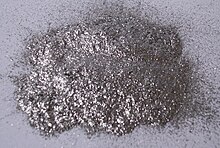Aluminium powder is powdered aluminium.

This was originally produced by mechanical means using a stamp mill to create flakes. Subsequently, a process of spraying molten aluminium to create a powder of droplets was developed by E. J. Hall in the 1920s. The resulting powder might then be processed further in a ball mill to flatten it into flakes for use as a coating or pigment.[1] Aluminum Powder features low density with high conductivity.[2]
Characteristics
editThe melting point of aluminium powder is 660 °C.[3]
Usage
edit- autoclave aerated concrete
- cosmetic colourant
- fingerprint powder[4]
- metallic paint
- pyrotechnics (including the M-80 firecracker)
- refractory
- rocket and missile fuel such as the solid rocket boosters of the Space Shuttle[5]
- thermite
- Electrically conductive filler material for EMI shielding applications.[6]
Depending on the usage, the powder is either coated or uncoated.
Safety
editAluminium is insoluble. If the powder or dust is breathed in then little of it will be absorbed but it may interfere with the clearance mechanism of the lung. High levels of exposure over many years may result in aluminosis which causes pulmonary fibrosis.[7]
Aluminium powder and dust is highly flammable and creates a significant risk of fire or explosion. There have been many incidents in industries which produce such dusts and powders.[8]
See also
editReferences
edit- ^ Joseph R. Davies (1993), "Powder Metallurgy Processing", Aluminum and Aluminum Alloys, ASM International, p. 275, ISBN 9780871704962
- ^ Gromov, A.A.; Nalivaiko, A.Yu (2019). "Chapter 5 - Aluminum Powders for Energetics: Properties and Oxidation Behavior". In Yan, Qi-Long (ed.). Nanomaterials in Rocket Propulsion Systems. Elsevier. pp. 151–173. ISBN 9780128139080.
- ^ Friedman, Raymond (1998). Principles of Fire Protection Chemistry and Physics. Jones & Bartlett Learning. ISBN 9780877654407.
- ^ Champod, Christophe; Lennard, Chris J.; Margot, Pierre; Stoilovic, Milutin (2004-04-27). Fingerprints and Other Ridge Skin Impressions. CRC Press. ISBN 9780203485040.
- ^ Space Shuttle Basics –Solid Rocket Boosters, NASA, archived from the original on 2000-10-02
- ^ "Silver-coated Aluminum Powder". Stanford Powders. Retrieved Aug 29, 2024.
- ^ "Aluminium, Dusts containing aluminium as metal, aluminium oxide and aluminium hydroxide", MAK Value Documentation, 2007, doi:10.1002/3527600418.mb742990vere4313
- ^ Urben, Peter (2013-10-22), Bretherick's Handbook of Reactive Chemical Hazards, Elsevier, p. 22, ISBN 978-0-08-052340-8
External links
edit